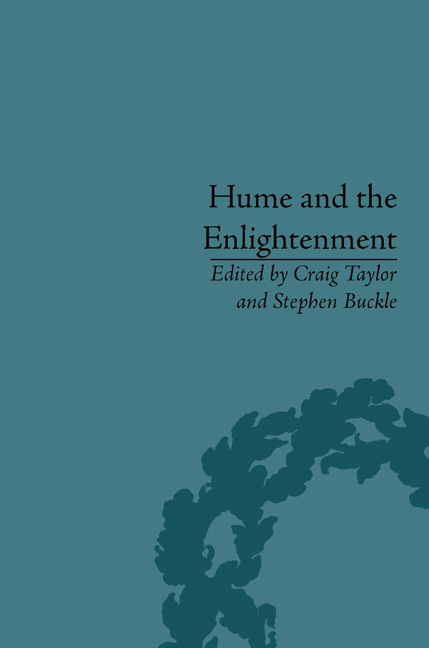Book contents
- Frontmatter
- CONTENTS
- Acknowledgements
- List of Contributors
- Abbreviations
- Introduction: Hume and his Intellectual Legacy
- 1 Hume and the Enlightenment
- 2 Will the Real Enlightenment Historian Please Stand Up? Catharine Macaulay versus David Hume
- 3 Philosophy, Historiography and the Enlightenment: A Response to Green
- 4 Hume's Enlightenment Aesthetics and Philosophy of Mathematics
- 5 Part 9 of Hume's Dialogues and ‘The Accurate Philosophical Turn of Cleanthes
- 6 ‘Strange Lengths’: Hume and Satire in the Dialogues Concerning Natural Religion
- 7 A Modern Malignant Demon? Hume's Scepticism with regard to Reason (Partly) Vindicated
- 8 Hume on Sympathy and Cruelty
- 9 Hume's Natural History of Justice
- 10 Hume and Rawls on the Stability of a Society's System of Justice
- 11 Can Hume's Impressions of Reflection Represent?
- 12 Mechanism and Thought Formation: Hume's Emancipatory Scepticism
- Notes
- Works Cited
- Index
11 - Can Hume's Impressions of Reflection Represent?
- Frontmatter
- CONTENTS
- Acknowledgements
- List of Contributors
- Abbreviations
- Introduction: Hume and his Intellectual Legacy
- 1 Hume and the Enlightenment
- 2 Will the Real Enlightenment Historian Please Stand Up? Catharine Macaulay versus David Hume
- 3 Philosophy, Historiography and the Enlightenment: A Response to Green
- 4 Hume's Enlightenment Aesthetics and Philosophy of Mathematics
- 5 Part 9 of Hume's Dialogues and ‘The Accurate Philosophical Turn of Cleanthes
- 6 ‘Strange Lengths’: Hume and Satire in the Dialogues Concerning Natural Religion
- 7 A Modern Malignant Demon? Hume's Scepticism with regard to Reason (Partly) Vindicated
- 8 Hume on Sympathy and Cruelty
- 9 Hume's Natural History of Justice
- 10 Hume and Rawls on the Stability of a Society's System of Justice
- 11 Can Hume's Impressions of Reflection Represent?
- 12 Mechanism and Thought Formation: Hume's Emancipatory Scepticism
- Notes
- Works Cited
- Index
Summary
David Hume and the Scottish Enlightenment
The impact of the numerous intellectual advancements that took place during the Scottish Enlightenment continues to be quite considerable, as the ideas of the period's great thinkers – David Hume, Adam Smith, Thomas Reid, and others – continue to be discussed today. One of the key disciplines of the Scottish Enlightenment was moral philosophy and it is in this field that Hume made some of his most original contributions.
Hume's moral philosophy is contained primarily in the third book of A Treatise on Human Nature, which was later recast as An Enquiry Concerning the Principles of Morals. An adequate understanding of Hume's moral philosophy, however, is predicated on an adequate understanding of Hume's views on the passions, as many claims made in Book 2 of the Treatise are foundations for the claims he subsequently develops in Book 3.
An examination of Hume's views on the passions – or, more specifically, what he classifies as the indirect passions – reveals an elegant account that is marred by seemingly anomalous claims made in paragraph 2.3.3.5 of the Treatise. Although Hume's extensive discussion of the passions both prior to and after 2.3.3.5 makes it clear that passions are intentional or directed, in 2.3.3.5, he seems to deny that passions represent anything. These views are generally taken by scholars to contradict each other.
- Type
- Chapter
- Information
- Hume and the Enlightenment , pp. 157 - 170Publisher: Pickering & ChattoFirst published in: 2014



